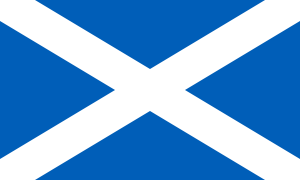Language/Scottish-gaelic/Culture/Scotland-Timeline
< Language | Scottish-gaelic | Culture
Jump to navigation
Jump to search
Rate this lesson:
Historical Timeline for Scotland - A chronology of key events
Scotland Timeline[edit | edit source]
| Date | Event |
|---|---|
| -6000 | Arrival of the first men in Scotland. |
| -3000 to -1000 | First vestiges of the Bronze Age (monoliths). |
| -500 | Celtic colonization. |
| 79 | Conquest by the Romain Agricola. Tacitus baptizes the country "Caledonia". |
| 122-127 | Construction of Hadrian's Wall to contain the Picts. |
| 410 | Capitulation of the Romans who leave the island. |
| 563 | St Columba from Ireland settles on the island of Iona. |
| 700 | First incursions of the Vikings from Norway. |
| 843 | Coronation of Kenneth MacAlpin, first king of Scotland. Scots and Picts join forces against the Vikings. |
| 1124 | Beginning of the reign of DavidIer and establishment of a feudal system. |
| 1266 | Alexander III drives out the Vikings and the Hebrides are integrated into the Scottish kingdom. |
| 1295 | Signature of the Auld Alliance between Philippe le Bel and Jean Baillol. |
| 1296 | First attacks by England to conquer Scotland. William Wallace then Robert the Bruce resist EdwardIer of England. |
| 1328 | Signature of the Treaty of Northampton which officially recognizes the independence of Scotland and the royal power of Robert Bruce. |
| 1371 | Reign of RobertII, first of the Stuart dynasty. English invasion attempts continue. |
| 1472 | Shetland and Orkney are attached to the crown. |
| 1542 | Mary Stuart becomes Queen of Scots. |
| 1558 | She marries FrançoisII in France, who becomes king of France. |
| 1561 | Return of Mary Stuart to Scotland following the death of her husband. |
| 1567 | JamesVI succeeds his mother after the defeat of Carberry Hill. |
| 1603 | James VI, King of Scotland, succeeds Queen Elisabeth, who dies without an heir, and becomes King JamesIer of England. It is the Union of the two crowns. |
| 1625 | His son Charles I succeeds him. |
| 1638 | The Presbyterian Church in Edinburgh revolts against the king in favor of the Anglican liturgy. Civil war in Scotland between supporters of the king and supporters of Parliament led by Cromwell. This entire period is known as the War of the Three Kingdoms. |
| 1643 | Execution of CharlesIer by Cromwell. |
| 1650 | Cromwell dominates Scotland after defeating the Royalists at Dunbar. |
| 1660-1685 | Restoration of the British monarchy with CharlesII. |
| 1707 | Signature of the Treaty of Union between Scotland and England, under the leadership of JamesII. |
| 1745 | Bonnie Prince Charlie launches the ultimate Jacobite revolution to return the throne to the Stuarts but is crushed the following year in Culloden. |
| 1746 | From there, the repression on the traditions of the Highlands is merciless: clans, language, music ... |
| 1790 | The Highland Clearances begin and the peasants are evicted by the landowners to make way for the flocks of sheep. They migrate to America, Canada, Australia ... |
| 19th century | Scotland is at the center of the Industrial Revolution. Many railways are created and Glasgow is gaining momentum. |
| 1885 | Appointment of a Secretary of State for Scotland within the British cabinet. |
| 1934 | Creation of the Scottish National Party by John MacCormick. |
| 1939 | Installation of the Scotland Office in London. |
| 1973 | Administrative decentralization in favor of Scotland. |
| 1980 | Decade marked by the economic boom in oil from the North Sea. |
| 1991 | 20% of Scots say they are in favor of their independence in a referendum. |
| 1997 | 74.3% of Scots approve of devolution (decentralization of executive power) in the referendum organized by Tony Blair. |
| 1999 | Creation of the Scottish Parliament in Edinburgh. Independent management of several sectors: justice, health, education and training, tourism, economic development ... |
| 2004 | Inauguration of the seat of Parliament in Edinburgh, built near Holyrood Palace. |
| 2005 | Gaelic Language Act passed by the Scottish Parliament for recognition in broadcasting, the arts and education. |
| 2011 | Following the Scottish elections in May 2011, the Scottish National Party (SNP), which campaigned for Scottish independence, has a majority in parliament. |
| 2012 | Independenceist Alex Salmond, Scottish Prime Minister, launched a twenty-week consultation on Wednesday 25 January, the first step towards the organization of a referendum on independence in 2014. |
| 2013 | The launch of the largest fleet of tidal turbines in Europe began in September. |
| 2014 | After a fierce campaign, the Scots reject independence by referendum on September 14 by 55.4%. |
| 2015 | The SNP wins 50% of the vote and 56 seats out of 59 possible in the UK general election on 7 May. |
| 2016 | On June 23, the United Kingdom votes for Brexit at 51.89%, despite 62% in favor of keeping Scotland in the EU. |
| 2017 | On June 8, early elections are held at the call of Theresa May, the SNP loses 21 seats (from 56 to 35). |
Sources[edit | edit source]
World Timelines[edit source]


